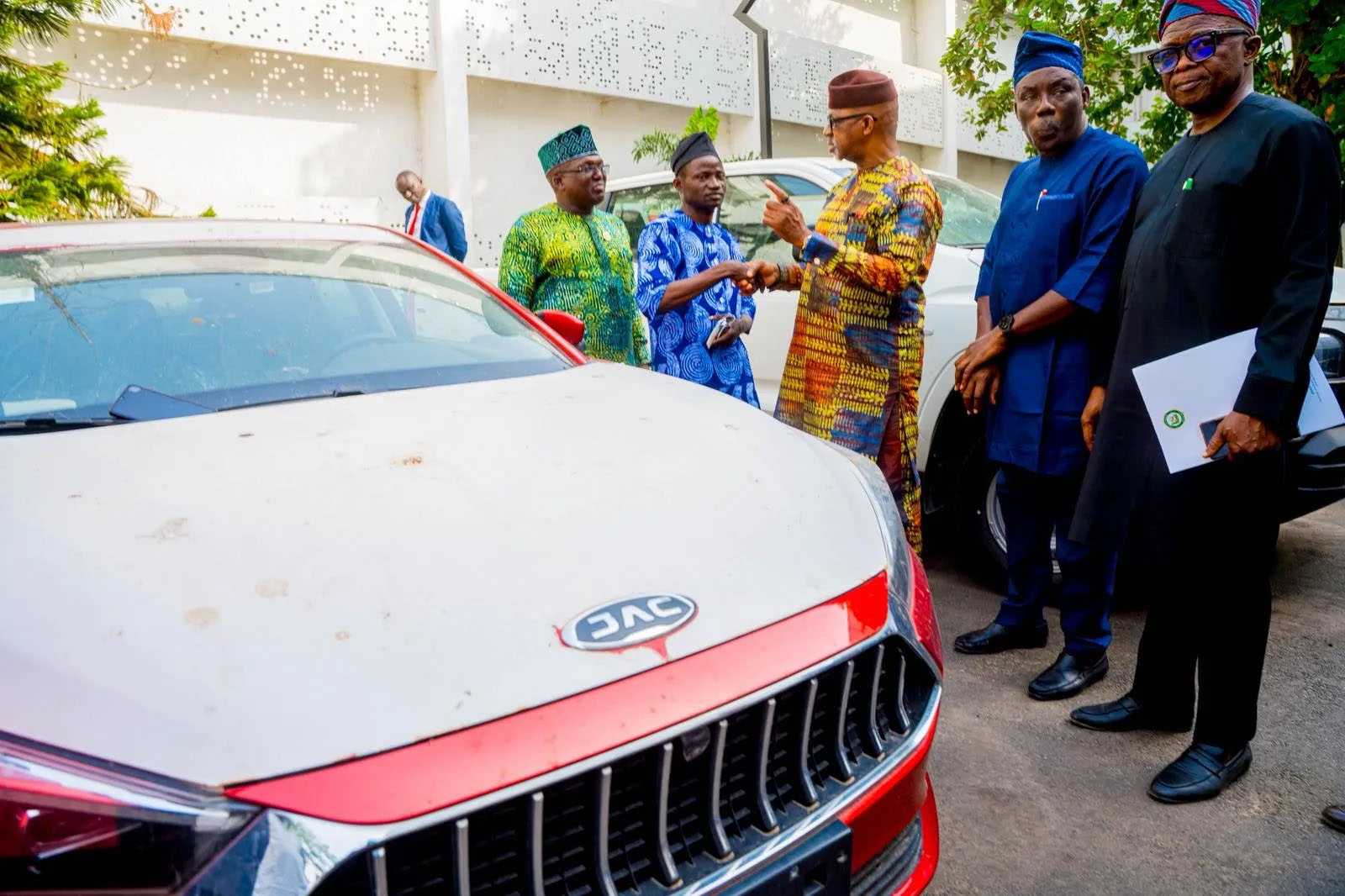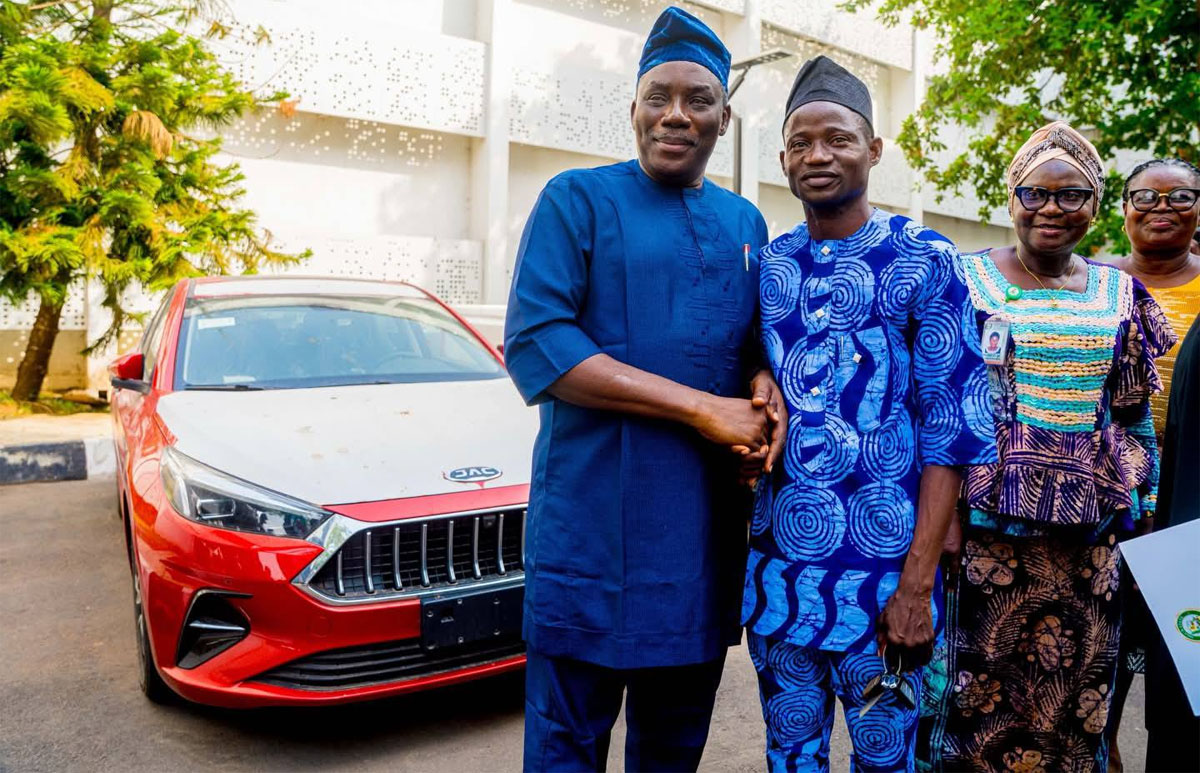Education
Amazon Energy donates virtual training room to UNILAG

A well-equipped Virtual Training Room has been donated to the Chemical and Petroleum Engineering Department of the University of Lagos to help promote technology and the practical component of engineering.
The Virtual Training Room was commissioned at the department by a team from Amazon Energy, led by the Group Chief Executive Officer, Engr. David Oluwatimehin, who obtained a bachelor’s degree in Chemical Engineering from the institution.
Senior members of the Faculty of Engineering, led by the Dean, Prof. Obanisola Sadiq, and the Head of Department Dr Atoke Ogunibayo, attended the event.
The initiative is said to be part of the Corporate Social Responsibility of the organisation championed by Amazon Energy Foundation (AEF) its CSR arm. The company’s (CSR) activities cut across everything the organisation does.
According to the Group CEO of the company, Amazon Energy is committed to behaving ethically and contributing to economic development.
“I realised that students need to do what they have to do in school and come out and education has given a background for us. More important for me is the need to mentor these young ones,’ Oluwatimehin said.
Prior to the commissioning of the Virtual Training Room, Oluwatimehin had told the audience about the great strides Amazon Energy had made.
He said, “Amazon Energy is an integrated energy services company. Today, we started out doing engineering; we have since integrated our processes to include fully EPC for several years.
“We started doing full EPC work engineering and construction and procurement about 8 years ago, having upgraded our management systems to enable us to do EPC work.
“We have been ISO certified for engineering over 10 years ago but recently got our ISO certificate for EPC work. “Recently, we picked up an EPC job where we were flaring down 20 million cubic metres of gas.
“We have designed and built four compressors, two ATM compressors and two LB compressors the client upgraded the scope of the work and added a 24-inch 18.5KM pipeline across the River Niger which we built in four months, and it’s already delivering gas.”
To demonstrate how the Training Room works, the Managing Director/Chief Operating Officer, Amazon Energy, Engr. Chinedu Okpareke, who watched history being made via virtual participation, addressed the audience.
The Virtual Training Room is available to all Chemical and Petroleum Engineering students, which will help increase their accessibility to information, thereby improving their technical skills.
The Dean, Prof. Sadiq, said the Virtual Training Room would serve them well, noting that it would be put to good use for the education of the students.
The HOD, Dr. Ogunibayo said, “Amazon Energy surpassed our expectation.”
Education
Reasons Behind UniAbuja’s Expulsion of 28 Students, Withdrawal of 15 Certificates

Reasons Behind UniAbuja’s Expulsion of 28 Students, Withdrawal of 15 Certificates
The University of Abuja (UniAbuja), now renamed Yakubu Gowon University, has expelled 28 students and revoked certificates of 15 graduates following findings of serious academic and disciplinary violations.
The decision was made at the 191st Regular Meeting of the University Senate held on Thursday, January 28, 2026, after reviewing reports and recommendations from the Student Disciplinary Committee (SDC).
Reasons for Expulsion and Certificate Withdrawal
According to a statement signed by Dr. Habib Yakoob, Acting Director of Information and University Relations, the students were found guilty of offences including threats to life, physical assault, examination malpractice, conspiracy, burglary, theft, cult-related activities, possession and use of hard drugs, and falsification of O’Level results submitted during admission. Some students also failed to appear before the committee despite repeated invitations.
The 15 graduates had their certificates withdrawn for similar non-compliance, rendering their credentials null and void. Meanwhile, nine students were cleared after investigations, and 33 others received formal warnings for infractions including conspiracy, hostel racketeering, and fighting.
READ ALSO:
- Yoruba Muslim Group Dismisses Viral Ramadan Date Claim, Reaffirms Sultan of Sokoto’s Authority
- FCT Council polls: APC Wins Four Chairmanship Seats as PDP Takes Gwagwalada
- Dangote Opens Refinery Investment to Nigerians With Public Share Sale Plans
University’s Commitment to Discipline
The Vice-Chancellor and Chairman of Senate, Professor Hakeem Babatunde Fawehinmi, reaffirmed the university’s dedication to maintaining a safe, disciplined, and conducive learning environment. He emphasised that academic integrity is a core principle and that violations would be sanctioned without compromise.
Professor Fawehinmi praised the SDC for its thorough and diligent handling of cases and urged students to conduct themselves responsibly to safeguard their academic futures. He also highlighted ongoing university initiatives, including student engagement, counselling, and orientation programmes, aimed at preventing misconduct and promoting responsible citizenship and academic excellence.
The university described the actions as part of a zero-tolerance approach to misconduct, reinforcing its commitment to upholding high moral and academic standards on campus.
Reasons Behind UniAbuja’s Expulsion of 28 Students, Withdrawal of 15 Certificates
Education
UTME: JAMB Clarifies Position on Hijab During Biometric Capture

UTME: JAMB Clarifies Position on Hijab During Biometric Capture
The Joint Admissions and Matriculation Board (JAMB) has clarified that candidates are not required to remove their hijab during the Unified Tertiary Matriculation Examination (UTME) registration process.
The examination body issued the clarification following the circulation of a viral video alleging that a Muslim candidate was compelled to remove her hijab before capturing her biometric photograph at a registration centre.
In a statement addressing the controversy, JAMB dismissed claims of a policy prohibiting the use of hijab, describing such reports as misleading. The board reiterated that it respects candidates’ religious rights and does not mandate the removal of religious head coverings during registration.
READ ALSO:
- ₦13.7bn Payroll Fraud Claim Pits Audit Firm Against Osun Government
- Breaking: INEC Declares APC’s Joshua Ishaku Winner of Bwari Chairmanship Election
- FCT Poll: APC’s Maikalangu Wins AMAC Chairmanship as Collation Continues
However, JAMB explained that during biometric data capture, candidates may be asked to adjust their head coverings slightly to ensure that key facial features are visible for proper identification. According to the board, this requirement is strictly for technical purposes and aligns with standard identification procedures used in official documentation processes.
The board emphasized that the adjustment does not equate to a ban on hijabs, noting that clear visibility of facial features is necessary to meet biometric verification standards and prevent identity-related issues.
JAMB urged the public to disregard misinformation and advised candidates and parents to seek clarification through official communication channels to avoid unnecessary panic.
The clarification comes amid growing public interest in ensuring that examination procedures remain inclusive while maintaining the integrity of the registration and identification process.
UTME: JAMB Clarifies Position on Hijab During Biometric Capture
Education
Ogun Gov Rewards Nigeria’s Best Primary School Teacher with Car, Bungalow

Ogun Gov Rewards Nigeria’s Best Primary School Teacher with Car, Bungalow

Ogun Gov Rewards Nigeria’s Best Primary School Teacher Solanke Francis Taiwo with Car and Bungalow
The Ogun State Governor, Dapo Abiodun, has honoured Mr Solanke Francis Taiwo, a primary school teacher at Ansa‑Ur‑Deen Main School I, Kemta Lawa, Abeokuta, with a brand new car and a two‑bedroom bungalow in recognition of his achievement as Nigeria’s Overall Best Primary School Teacher for the 2025/2026 academic year.
The presentation took place at the Governor’s Office in Oke‑Mosan, Abeokuta, with the Commissioner for Education, Science and Technology, Prof Abayomi Arigbagbu, and the ministry’s Permanent Secretary, Mr Oloko, in attendance. The gifts were part of a broader effort to motivate teachers, reward professional excellence, and highlight the state’s education reforms.
Speaking at the event, Prof Arigbagbu said the award demonstrates the effectiveness of the Ogun State Education Revitalisation Agenda, which is built on six pillars including curriculum enhancement, school administration, innovation, infrastructure, funding, and teachers’ welfare. “When you do things consistently and efficiently, you record results. This same teacher won the Ogun State Best Teacher Award in October before clinching the national award in Abuja. This confirms that our education sector has been truly revitalised,” he said.
READ ALSO:
- Police Bust Gang Armoury, Arrest Two Suspects in Delta
- Peter Obi Launches ‘Village Boys Movement’ to Rival Tinubu’s City Boys Ahead of 2027
- Woman Dies in Bandits’ Camp After Family Pays ₦25 Million Ransom

Ogun Gov Rewards Nigeria’s Best Primary School Teacher Solanke Francis Taiwo with Car and Bungalow
He highlighted the state’s successes in national competitions, including the JETS contests, where Ogun students won 18 out of 24 awards in one year, with a single student claiming nine prizes. The commissioner also noted that Ogun’s Technical and Vocational Education and Training (TVET) model and education digitisation initiatives have attracted attention from other states and received commendation from the Federal Government and the National Board for Technical Education.
Governor Abiodun reaffirmed his commitment to teacher development, pledging continuous support through workshops, seminars, digital learning platforms, and AI-powered instructional tools. He said the gifts of a car and bungalow are intended to inspire other educators to strive for excellence and innovation in their teaching.
In his remarks, Mr Solanke expressed gratitude to the governor and the education ministry for fostering an enabling environment for teaching and learning. He vowed to continue improving student learning outcomes and collaborating with colleagues to ensure that Ogun State remains a leader in education excellence.
“I feel fulfilled and honoured. I will continue to give my best and encourage fellow teachers to remain dedicated to nurturing the potential of every student,” he said.
The recognition of Mr Solanke reflects Ogun State’s strategic investment in education, commitment to teacher welfare, and the effectiveness of policies that have positioned the state as a model for academic excellence in Nigeria.
Ogun Gov Rewards Nigeria’s Best Primary School Teacher with Car, Bungalow
-

 Business12 hours ago
Business12 hours agoDangote Opens Refinery Investment to Nigerians With Public Share Sale Plans
-

 Politics2 days ago
Politics2 days agoPeter Obi Launches ‘Village Boys Movement’ to Rival Tinubu’s City Boys Ahead of 2027
-

 Education1 day ago
Education1 day agoUTME: JAMB Clarifies Position on Hijab During Biometric Capture
-

 News3 days ago
News3 days agoPolice to Arrest TikToker Mirabel After She Recants False Rape Claim
-

 International3 days ago
International3 days agoEpstein, Ex-Israeli PM Named in Alleged Profiteering From Boko Haram Crisis
-

 Politics6 hours ago
Politics6 hours agoTinubu Hails Wike as APC Dominates 2026 FCT Area Council Elections
-

 Education2 days ago
Education2 days agoOgun Gov Rewards Nigeria’s Best Primary School Teacher with Car, Bungalow
-

 Politics1 day ago
Politics1 day agoADC Defeats APC to Win First Polling Unit in FCT Area Council Election



